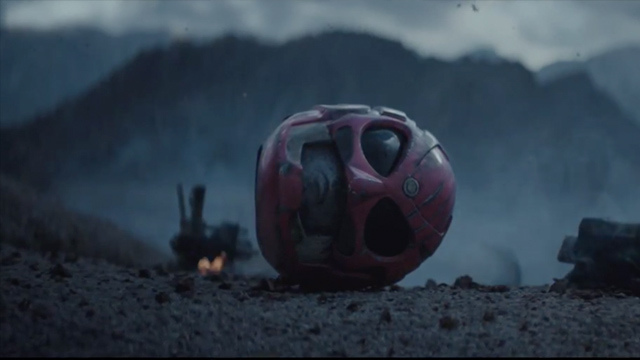Earlier this week a short film was released featuring an R-rated version of the Power Rangers. The film is violent, twisted, sexy, and makes use of fairly impressive visual effects (let’s not forget the rather laughable dialogue.) It even has a bit of star power in Katee Sackhoff of Battlestar Galactica fame, and James Van Der Beek from…well, you know who he is.
But dropping a rainbow-clad sextet of teens from a kid’s show into a gritty, played-out, post-apocalyptic future and pitting them against the most overused threat in science fiction, The Machines, does not make for a good film. Adding bullets, cussin’, blood, gore, nudity, and sex doesn’t enhance the experience either.
Some people found it to be fantastic fun. Others saw it as complete and utter rubbish.
Let it be known that I prepared a response to the film earlier in the week in which I insulted just about everyone involved. I sat atop my proverbial high-horse to cast aspersions because I felt some nerdish need to defend my Mighty Morphin’ friends of yore.
But I deleted it. Started from scratch.
I did this after discussing the film briefly with a friend who suggested that Power/Rangers (which is a ridiculous reimagining of the title regardless) may not have been intended to be straight meat-headed fan service, but a critique of a film trend that may be living out its final days.
Since Christopher Nolan’s masterful Batman Begins in 2005, there has been a bit of an outcry for more realistic and hard-edged portrayals of fantastical characters and their stories. The argument being that there are some things you just can’t do in film if you want to appeal to the masses. The Fantastic Four films and Superman Returns were accused, rightfully so, of having an old-fashioned perspective on the titular heroes. And despite the Marvel Cinematic Universe’s wonderful balancing act between fun and peril, movie-goers continue to clamor for genre and superhero films to be grounded in a dark, nasty reality similar to Begins, its sequel The Dark Knight, and the threequel of the series, The Dark Knight Rises.
Why? Because Nolan’s Dark Knight trilogy worked. The movies were Good. They made serious money. And if it worked with Batman, it was only a matter of time before that Dark & Gritty formula was applied to other properties.
Recently, Man of Steel—a film I will continue to defend despite the remainder of this paragraph—struggled under the weight of its own humorless and bleak point of view. It separated Superman fans into two camps: those who want the film’s vision to continue on, and those who were aghast at how Zack Snyder and Christopher Nolan treated the character—a seemingly uncaring, angry, god-like alien.
Captain America: The Winter Soldier was Marvel Studios’ darkest outing to date—which, by the way, was still able to balance the fun/peril equation. Regardless, the film’s realism was intense, violent, and quite frightening at times.
Dark & Gritty sells.
But to what end? Everything Good is eventually bastardized into irrelevancy, right?
In re-examining Power/Rangers, an extreme version of the Dark & Gritty experiment, it seems that there may be some actual intent involved in the making of the of this corny, over-the-top film. It takes Dark & Gritty to its logical conclusion: morphing something intended to entertain and stoke the imaginations of children into a tasteless, bloody mess for the sake of wowing adults who have grown away from the source material. It is the destruction of wonderment and the distortion of fun. It doesn’t adapt a story for an adult audience, it drops familiar elements into a setting full of clichés and human nastiness. It preys on nostalgia and stuffs the horrors of a corrupt world in its place. And at the end of the day, it’s nothing but a mindless good time.
Power/Rangers may very well be the film that shows people just how ridiculous Dark & Gritty genre and superhero movies will become if they continue on their current trajectory. A series of films one-upping their predecessors with next-level-cheap thrills, offering paper-thin narratives with hyper-violence and nudity as the only selling points.
Maybe I’m wrong. Maybe my original opinion of Power/Rangers was more accurate—that it was made straight-faced and without an ounce of self awareness with the intention of exploiting its target audience.
Maybe I’m right. Maybe it was intended to be viewed with a critical lens in order to ask ourselves just how far we are willing to go to entertain ourselves.
Either way, Power/Rangers is effective in showing us that Dark & Gritty genre and superhero films may not have died just yet, but they are choking to death on their own gratuitous need to impress.
I’m no fool. Hackneyed drivel works sometimes. But Power/Rangers can only work if its intention is to show writers, directors, producers, whoever, how not to make a film.
